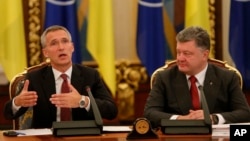The head of NATO pledged to help Ukraine defend itself against pro-Russian separatists on Tuesday but disappointed some in Kyiv who seek supplies of defensive weaponry that the West fears would threaten a fragile cease-fire with the rebels.
In an opulent gilded state room in the presidential palace, Secretary-General Jens Stoltenberg told Ukraine's National Security Council it had no closer partner than the U.S.-led military alliance and he signed agreements to modernize the armed forces.
"NATO does not provide or supply weapons," Stoltenberg told Reuters before the meeting with President Petro Poroshenko and security chiefs, where he stressed the symbolic nature of his first visit to Ukraine as head of NATO, 18 months after Russia seized Ukraine's Crimean peninsula.
"The main focus now is the implementation of the Minsk agreement," Stoltenberg said, adding that Monday was the first day since a peace deal was signed in February in which no violations of the cease-fire were registered.
The ebb in violence in Ukraine's east, where the West says Russia is supporting and arming separatists and has positioned its own heavy weapons, was an opportunity for new momentum for diplomacy, Stoltenberg said.
Ukrainian plans to sign a new military doctrine in Stoltenberg's presence — a document identifying Russia as Ukraine's only aggressor — were cancelled, apparently to spare the NATO chief diplomatic embarrassment.
Eastern outpost
But Poroshenko and others, while accepting that non-NATO Ukraine could not expect direct military aid, portrayed their country as a bulwark against Russian aggression that could one day threaten other parts of the continent.
"De jure we are not allies, but de facto we are much more than partners. Ukraine is the most eastern outpost of the Euro-Atlantic area," Poroshenko said.
Prime Minister Arseny Yatseniuk, sitting alongside Stoltenberg at the security council meeting, was blunter, saying the country needed to defend itself against Russia, which denies it has provided weapons to the rebels.
"Defense capabilities are essential to us in the face of a nuclear country, which has spent tens of billions of dollars on modernizing its army," Yatseniuk said.
Stoltenberg sees Ukraine as the most complex of Europe's many crises and backs the 11-step Minsk peace deal signed in February that set an end-year deadline for implementation.
He sees the alliance's role mainly limited to helping rebuild the Ukrainian army after years of mismanagement that was reflected in defeats by the pro-Russian rebels.
Former president Viktor Yanukovych dropped a bid to join NATO in 2010 to please Moscow. When he moved last year to decline an EU partnership deal and draw closer to Moscow, he was toppled by protests dubbed by Russia as a Western-backed coup.
The current pro-Western leadership under Poroshenko now sees NATO membership as the only way to protect its territory.
NATO, however, wants to avoid provoking Moscow. Russia opposes any potential expansion of NATO to former communist areas of eastern and southeastern Europe, part of a battle for influence that lies at the heart of the conflict in Ukraine.





